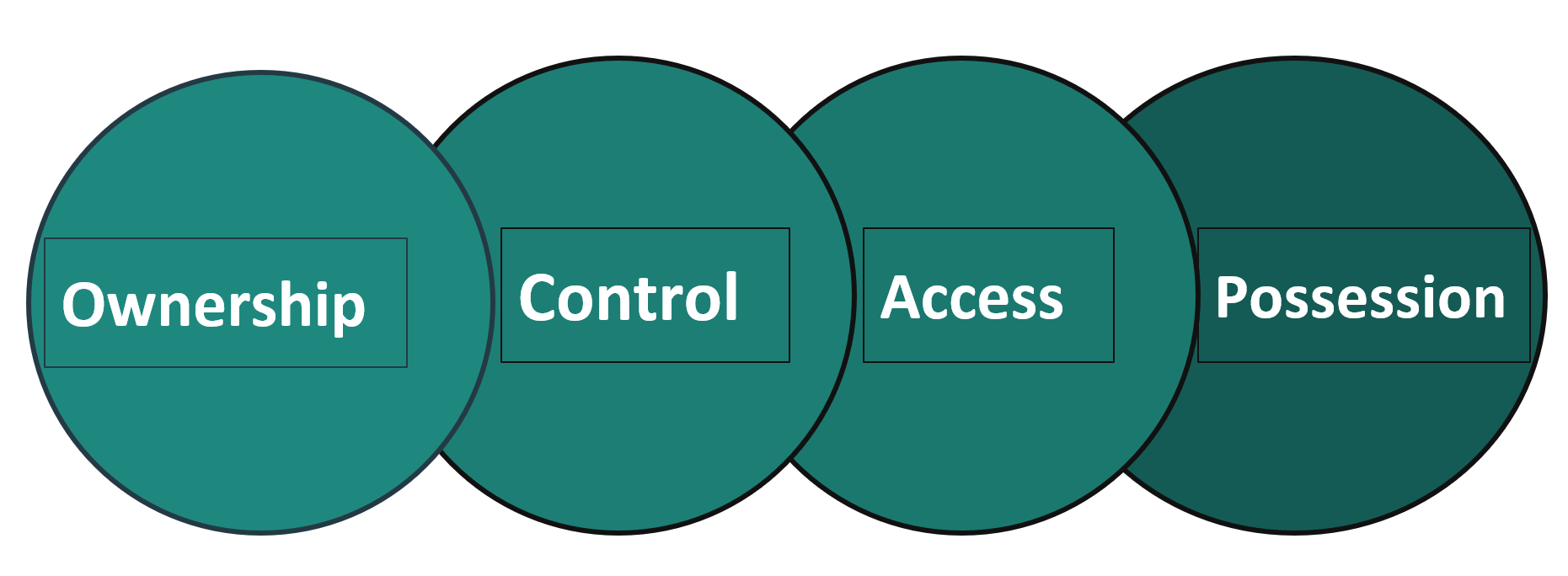Module 1: Ethical and Legal Considerations
First Nations Governance Practices
First Nations principles of ownership, control, access, and possession (OCAP®)
The First Nations principles of OCAP®[1] are a set of standards that establish how First Nations data should be collected, protected, used, or shared. They are the de facto standard for how to conduct research with First Nations.
OCAP® asserts that First Nations alone have control over data collection processes in their communities and that they own and control how this information can be stored, interpreted, used, or shared.
Learner notes
Note that the term “First Nations” and not “Indigenous” was used intentionally, as OCAP® is the preferred governance model of many First Nations. OCAP® principles are a set of standards for First Nations information governance that support a First Nations path to data sovereignty.
Source and recommended reading: The First Nations Principles of OCAP® – The First Nations Information Governance Centre (fnigc.ca)
The First Nations Information Governance Centre developed the First Nations Principles of OCAP®. They are the most widely used protocols for Knowledges and data governance within a First Nations context, and they promote Indigenous data sovereignty. OCAP® is a set of principles aimed at protecting mainly First Nations ownership, jurisdiction, and information. Many First Nations and other Indigenous communities across Canada have adopted OCAP® to govern the ethical conduct of research that takes place on their lands and about their people because OCAP® can be adapted to individual community needs.
Learner notes
OCAP® is a useful model that can be adapted to individual community needs. OCAP® cannot be a single standard for all Indigenous Peoples, but the principles can be adapted and used by Indigenous communities as they see fit. Indigenous Peoples want to see mandatory training on OCAP® in post-secondary institutions for researchers and students who intend to conduct research with Indigenous Peoples. It is also worth noting that the Assembly of First Nations drafted a framework to outline principles that build off the First Nations Principles of OCAP®.
Source and recommended reading:
- Truth and Reconciliation Commission of Canada. Truth and Reconciliation Commission of Canada: Calls to Action [PDF]. 2015.
- United Nations. United Nations Declaration on the Rights of Indigenous Peoples [PDF]. 2018.
- First Nations Information Governance Centre. The First Nations principles of OCAP®. Accessed October 18, 2019
Why the First Nations Principles of OCAP®?
OCAP® principles can help guide ethical ways of working with First Nations who choose to share their data, information, and cultural knowledge. OCAP® principles reflect First Nations commitments to use and share information in a way that brings benefits to communities while minimizing harm.
Learner notes
The principles of OCAP® go beyond federal and provincial government privacy legislation, as privacy legislation is normally based in the dominant culture’s ways of seeing and moving in the world.
Source and recommended reading: Balancing the Narrative: Communications Guidelines for Indigenous-led Conservation [PDF] (ipcaknowledgebasket.ca)
In other words, OCAP® can inform how First Nations data should be collected, protected, used, or shared. OCAP® asserts that First Nations have control over data collection processes in their communities, and that they own and control how this information can be used and by whom.
Governance principles are intended to help reduce the potential harms associated with the use or misuse of any information about an Indigenous community, including harms that are:
- Physical
- Psychological
- Social
- Economic
- Legal
- Relational
Four principles of OCAP®

O is for Ownership
“Ownership refers to the relationship of First Nations to their cultural knowledge, data, and information. This principle states that a community or group owns information collectively in the same way that an individual owns his or her personal information.”
C is for Control
“Control affirms that First Nations, their communities, and representative bodies are within their rights to seek control over all aspects of research and information management processes that impact them. First Nations control of research can include all stages of a particular research project-from start to finish. The principle extends to the control of resources and review processes, the planning process, management of the information and so on.”
A is for Access
“Access refers to the fact that First Nations must have access to information and data about themselves and their communities regardless of where it is held. The principle of access also refers to the right of First Nations’ communities and organizations to manage and make decisions regarding access to their collective information. This may be achieved, in practice, through standardized, formal protocols.”
P is for Permission
“While ownership identifies the relationship between a people and their information in principle, possession or stewardship is more concrete: it refers to the physical control of data. Possession is the mechanism by which ownership can be asserted and protected.”
Learner notes
Localization
It is important to remember that each Indigenous community is unique and has its own lived realities and ways it wants to move forward. Therefore, the interpretation of OCAP® principles will be unique to each community. Every Nation has the authority to balance the benefits and harms associated with the collection and use of their information as it sees fit.
OCAP® principles were developed with a research context in mind but are highly relevant for any collaboration, curation, creation, or communications work.
Learner notes
Source and recommended reading: Balancing the Narrative: Communications Guidelines for Indigenous-led Conservation [PDF] (ipcaknowledgebasket.ca)
A note of understanding
Some Métis communities follow the First Nations Principles of OCAP®. As with other Indigenous communities, each Métis community has the authority to balance the benefits and risks associated with the collection and use of its information as it sees fit.
Attributions
- “Visual of OCAP®” diagram by Connie Strayer and Robyn Grebliunas is licensed under a CC BY 4.0 license.
- OCAP® is a registered trademark of the First Nations Information Governance Centre (FNIGC) (https://fnigc.ca/ocap-training/). ↵

